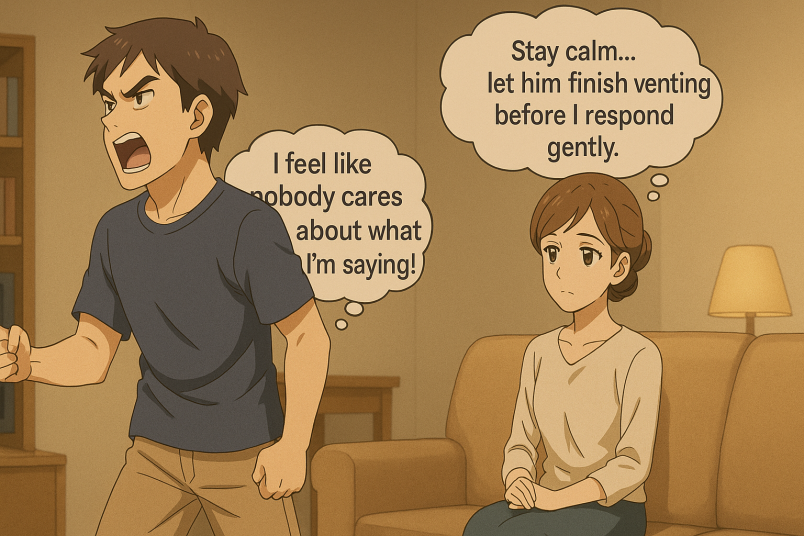How to Deal With an Angry Husband: 9 Actionable Strategies

Heal & Grow Daily for a Happier Relationship
Subscribe FREEKey Takeaways
Marriage.com AI Quick Summary
Sometimes love feels easy, and other times… it feels like you’re walking on eggshells. Every couple faces moments of tension, but when anger shows up in your marriage, it can leave you confused, hurt, or even a little scared.
You may wonder, “Is it something I said?” or “Will things get better?”
Arguments can happen in any relationship, yet when tempers flare too often, it’s hard not to take it personally. Learning how to deal with an angry husband isn’t about ignoring his feelings; it’s about finding steadier ground for both of you.
With patience, small shifts, and a little compassion, those heated moments don’t have to define your connection… they can actually open the door to deeper understanding.
Why do husbands get angry?
Anger rarely comes out of nowhere. For many husbands, it’s tied to everyday pressures—work deadlines, financial worries, or simply feeling unheard at home.
Sometimes, the weight of unspoken frustrations builds up until it spills over. And yes, even small things can trigger big reactions when stress is already high!
Research shows that unresolved anger management problems can lead to resentment, emotional distance, and even physical health issues over time.
Does that mean he doesn’t love or value you?
Not at all. Most of the time, anger is less about you and more about what he’s carrying inside. Understanding this truth can help you respond with compassion… instead of assuming the worst.
If your husband always seems angry, there’s likely more going on beneath the surface. Anger is rarely random—it often stems from underlying issues that may not be immediately obvious.
-
Stress and overwhelm
Life’s pressures, such as work, finances, or family responsibilities, can weigh heavily on him. When stress builds up without an outlet, it often comes out as irritability or anger. He might feel like he’s under constant pressure and doesn’t know how to ask for help, leading to emotional outbursts.
-
Unresolved emotional issues
Past experiences, trauma, or insecurities can create emotional baggage that affects his present behavior. If he hasn’t addressed these emotions, they can resurface as anger.
Maggie Martinez, LCSW, highlights,
The way your husband reacts when they’re angry is probably quite similar to how your husband’s father acted when he was angry. Remember that people learn from what they observed in childhood.
This could be his way of expressing pain or frustration over things he hasn’t fully processed.
-
Feeling unappreciated
A lack of acknowledgment for his efforts can leave him feeling undervalued. When he feels his contributions are overlooked, resentment builds up, making him prone to irritation and anger in daily interactions.
-
Communication problems
Difficulty expressing emotions or needs can lead to frustration. If he doesn’t feel heard or understood, he might channel that frustration into anger because he doesn’t know another way to communicate effectively.
5 possible signs of anger in your husband and how they might manifest
It’s not always about yelling or arguing—anger can show up in subtle and not-so-subtle ways. Maybe he withdraws and gives you the silent treatment, or perhaps you’ve noticed him throwing things when angry, leaving you unsure of how to deal with an angry husband.
Anger often manifests in different ways, and understanding these signs can provide clarity.
1. Physical outbursts
When anger feels overwhelming, it often spills into the physical space around you. Even if he isn’t directing it at you, objects or surroundings may become the target.
These moments can feel unpredictable and unsettling because the energy behind his anger is loud, visible, and hard to ignore.
- Throwing or breaking things: One obvious sign is your husband throwing things when angry, whether it’s a remote or a glass. It’s his way of releasing frustration, but it can create an unsafe environment for both of you.
- Tense body language: Clenched fists, rigid posture, or pacing are non-verbal signs that his anger is bubbling under the surface and might spill over soon.
2. Verbal outbursts
Sometimes, anger comes out through sharp and quick words without much thought. This can range from raised voices to a tone that feels harsher than usual.
The words may not always reflect what he truly means, but in the moment, it’s his way of letting the pressure inside escape.
- Frequent criticism: If he starts snapping over small things or constantly criticizes, it could be a sign he’s harboring deeper frustrations that he hasn’t expressed constructively.
- Shouting or harsh tone: Raised voices or an abrupt, harsh tone often indicate that his anger is overwhelming him and he’s struggling to communicate calmly.
3. Emotional withdrawal
Not every expression of anger is explosive—sometimes it’s quieter, marked by distance instead of noise. He may shut down, retreat emotionally, or disengage altogether.
While this might seem calmer on the surface, the silence often carries just as much tension as yelling would.
- Silent treatment: He might withdraw emotionally and stop talking for hours or even days, leaving you feeling isolated and unsure of what’s wrong.
- Avoiding eye contact or interaction: If he avoids interacting with you altogether, it could be his way of expressing anger without words, though it often creates more confusion and distance.
4. Sarcasm and passive-aggressive behavior
Anger doesn’t always come out in shouting—it can hide behind humor or subtle digs. Sometimes your husband might not feel comfortable expressing his frustration directly, so it slips out in the form of sarcasm.
What sounds like a joke on the surface may actually carry unspoken tension, leaving you caught between laughing it off and feeling hurt.
- Cutting remarks: He may use sarcasm or sly jokes to mask frustration, leaving you wondering if he’s truly upset.
- Backhanded compliments: Statements that sound supportive on the surface but carry a sharp edge are often a way of expressing irritation without being openly confrontational.
5. Controlling or impatient behavior
Not all anger explodes—sometimes it shows up as an urge to control, manage, or demand. When emotions run high, he may try to gain a sense of order by becoming more impatient with routines or insisting on things being done his way.
While it might look like perfectionism or just being “picky,” it often signals deeper frustration bubbling underneath.
- Quick frustration over routines: Small disruptions—like a late dinner or misplaced keys—might trigger outsized irritation.
- Unreasonable demands: Wanting things “done his way” can be a sign he’s channeling underlying anger into control, which can make you feel pressured or undervalued.
How does anger affect a marriage?
Anger is a natural emotion, but when it becomes uncontrollable or unpredictable, it can create a toxic and unsafe environment.
If your husband’s anger starts to involve physical aggression, like throwing or breaking things, slamming doors, or punching walls, it’s a sign that the situation might be escalating.
Even if the anger isn’t directed at you or the children, these behaviors can create fear, tension, and emotional distress in the household. It’s important to recognize that such an environment can have long-lasting effects on everyone involved, especially children, who might begin to associate conflict with fear or instability.
Another warning sign is if his anger turns verbally abusive. Yelling, name-calling, or making hurtful comments can erode your self-esteem and create an emotional wedge in the relationship.
Over time, verbal abuse can be just as damaging as physical aggression, leaving you feeling unsafe or even walking on eggshells to avoid triggering his outbursts.
If you find yourself constantly trying to manage his mood or avoid conflict, this may be a sign that his anger is affecting the emotional safety of the family.
So, pay attention to patterns of control or intimidation. If his anger is used to manipulate, dominate, or silence you, it’s a clear indication that his behavior is crossing a line. Feeling trapped or powerless in these moments can significantly impact your well-being and the overall harmony of your family.
How to deal with an angry husband: 9 actionable strategies
Dealing with a partner’s anger can feel overwhelming at times, leaving you unsure of what to say or do. The good news is, there are healthy ways to respond that can protect your peace while also supporting him.
Here are 9 practical strategies to help you handle his anger constructively while maintaining your emotional well-being.
1. Stay calm and don’t react immediately
When your husband is angry, it’s easy to get defensive or match his tone. Instead, try to stay calm. Reacting with anger only escalates the situation. Take a deep breath and give him space to express his emotions without interruption.
For example, if he raises his voice, respond in a steady tone like, “I understand you’re upset. Let’s talk when we’re both calmer.” This is how to deal with an angry husband biblically.
Here’s what you can do:
- Take a short pause before answering to keep your tone level.
- Step into another room briefly if you feel yourself getting overwhelmed.
- Practice grounding techniques like deep breathing or counting slowly to stay calm.
2. Recognize his triggers
Understanding what sets him off can help you prevent unnecessary conflicts. Pay attention to the situations or topics that lead to his anger.
For instance, if he’s frustrated after work, avoid bringing up stressful subjects right away. Instead, offer a supportive gesture like asking, “How can I help you relax tonight?”
Here’s what you can do:
- Keep a mental note of recurring patterns that lead to anger.
- Time-sensitive conversations when he’s more relaxed, like after dinner.
- Use positive distractions—like a walk or light humor—to shift the mood.
3. Set boundaries for healthy communication
It’s important to make it clear what behavior is unacceptable. Let him know that yelling or aggressive actions won’t resolve problems.
You might say, “I want to hear your concerns, but we need to talk calmly for me to understand you.” Consistently reinforcing this boundary encourages healthier communication over time.
Here’s what you can do:
- Gently but firmly state when a line has been crossed.
- Remind him of your boundary using consistent language each time.
- Suggest pausing the discussion until both of you can talk respectfully.
4. Validate his feelings without agreeing
Sometimes, all he needs is to feel heard, even if you don’t agree with his perspective.
Acknowledge his emotions by saying things like, “I see why that upset you,” without immediately defending yourself or others. This approach can defuse anger and help him feel respected.
Here’s what you can do:
- Repeat back what he said in your own words to show you understand.
- Use empathetic phrases like “I get that this is hard for you.”
- Avoid jumping into problem-solving until his emotions cool down.
5. Encourage open dialogue during calm moments
The best time to address his anger is when he’s not upset. Approach him when things are calm and ask, “Can we talk about how we handle arguments?”
For example, you can discuss how certain behaviors, like shouting or throwing things, affect the family and brainstorm better ways to handle conflict.
Here’s what you can do:
- Choose a relaxed setting, like a walk or shared meal, to talk.
- Use “I feel” statements instead of blame-focused language.
- Agree on simple “cooling-off” rules for heated situations.
6. Support him in managing stress
Help him find outlets to reduce stress, which might be fueling his anger. Suggest activities like exercising together, taking short walks, or encouraging hobbies he enjoys.
If his work is a constant stressor, consider helping him organize tasks or suggesting a weekend getaway to recharge.
Here’s what you can do:
- Invite him to join you in relaxing routines like yoga or stretching.
- Encourage short breaks from work, even just 10–15 minutes.
- Plan fun activities that shift focus away from daily stress.
7. Avoid taking his anger personally
Remember, his anger might not be about you, even if it feels directed at you. Instead of internalizing his frustration, remind yourself that his emotions could be linked to external pressures.
For instance, if he snaps about a messy house, it might stem from a tough day at work, not the actual clutter.
Here’s what you can do:
- Remind yourself quietly, “This isn’t about me.”
- Take a step back emotionally when his words sting.
- Focus on staying steady rather than reacting defensively.
8. Suggest professional help when needed
Sometimes, anger may be a sign of deeper issues that need expert support. If his anger feels unmanageable or frequent, suggest therapy or counseling.
You can approach the topic gently, saying, “I think talking to someone could help both of us deal with this better.” Couples counseling can also provide tools to improve communication and resolve underlying issues.
Here’s what you can do:
- Share articles or resources that highlight the benefits of therapy.
- Offer to attend sessions together to show support.
- Frame counseling as a step toward growth, not as a punishment.
9. Protect your own well-being
While supporting your husband is important, you can’t ignore your own needs. Constant exposure to anger can take a toll emotionally and physically. Prioritizing your mental health ensures you don’t lose yourself in the process of trying to help him.
Here’s what you can do:
- Lean on trusted friends or family for emotional support.
- Set aside time for personal activities that recharge you.
- Seek individual counseling if the situation feels overwhelming.
Watch this TED Talk where Dr. Shraddha Kashyap explores how reconnecting with your cultural background and practicing daily self-care can strengthen mental health in simple, meaningful ways:
What to do if the anger turns violent: Immediate & long-term steps
When anger turns violent, your safety and the safety of your family should become your top priority. Violence, whether physical, verbal, or emotional, is never acceptable. It’s important to take immediate action to protect yourself and seek help.
-
Immediate steps to take
If your husband’s anger turns into physical violence, leave the situation immediately. Go to a neighbor’s house, a friend’s place, or any safe location.
Avoid engaging with him during a violent outburst, as it can escalate the situation further. Example: Keep your car keys and phone easily accessible in case you need to leave in a hurry.
a. Call for help
Dial emergency services (like 911) if you or your family are in immediate danger. Police can help de-escalate the situation and ensure your safety.
For example, don’t hesitate to call for help, even if you feel unsure. Your safety is more important than anything else.
b. Inform someone you trust
Reach out to a friend, family member, or coworker and let them know what’s happening. Having someone aware of your situation can provide emotional and physical support.
c. Document incidents
Keep a record of violent incidents, including dates, times, and details. This documentation can be helpful if you decide to seek legal action or protection orders later.
-
Long-term steps
Reach out to domestic violence counselors or organizations that specialize in helping victims of abuse. They can provide guidance, resources, and emotional support.
a. Create an exit plan
Develop a plan for leaving if the violence persists. Pack an emergency bag with essentials like clothing, cash, important documents, and any medications.
b. Set boundaries and make decisions
Violence often escalates if left unaddressed. Decide whether the relationship can be repaired through counseling or whether separation is the safest option.
-
Helpful resources
If you ever feel overwhelmed or unsafe, reaching out for support can make all the difference. Here are some resources that can help you during a crisis.
- National Domestic Violence Hotline: Call 1-800-799-7233 or visit thehotline.org for confidential support and advice.
- Local women’s shelters: Many communities have shelters offering safety and resources for victims of domestic violence.
- Police and legal aid: Contact local authorities for protection orders or legal advice tailored to your situation.
Finding strength and safety
Every marriage has its rough patches, and anger can sometimes feel like a wall between you and the person you love most. The truth is, learning how to deal with an angry husband isn’t about “fixing” him—it’s about finding ways to protect your peace while staying connected.
Some days will feel heavier than others, and that’s okay. What matters is showing up with patience, compassion, and boundaries that keep you both safe. Love doesn’t mean avoiding conflict… it means finding healthier ways to grow through it, together.
Want a healthier, happier relationship - one step at a time?
 Tips
Tips
Write your tip or submit a video tip
All tips are reviewed before the publishing.
Share this article on
Recent Articles
Related Quizzes
Heal & Grow Daily for a Happier, Healthier Relationship
Subscribe FREE on YouTube We'd love your feedback!
We'd love your feedback!
 Expert Q&A
Expert Q&A
Ask your question related to this topic & get the support you deserve from experts.





















 Thanks for your feedback!
Thanks for your feedback!